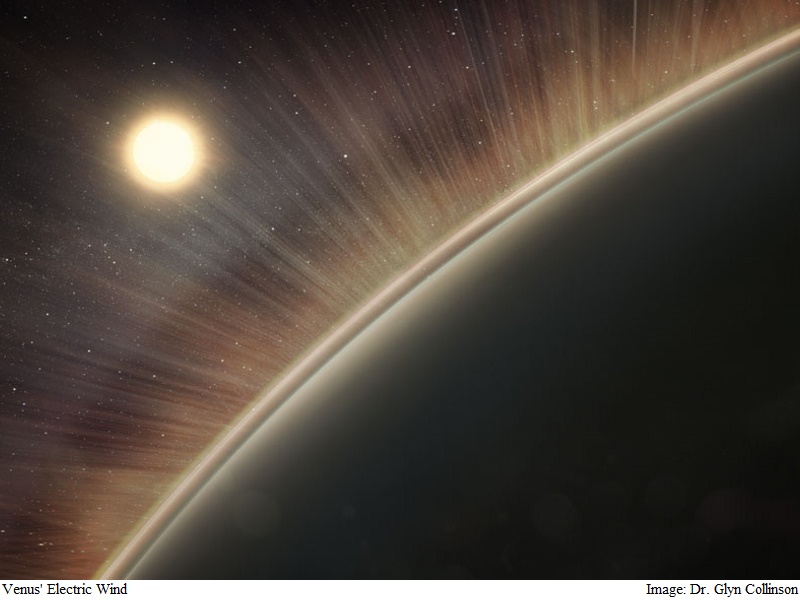- Home
- Science
- Science News
- Venus' Electric Wind Blamed for Lack of Water on Second Planet From the Sun
Venus' Electric Wind Blamed for Lack of Water on Second Planet From the Sun

Venus has an "electric wind" strong enough to remove the components of water from its upper atmosphere, the study said.
"It's amazing, shocking," said Glyn Collinson, scientist at Nasa's Goddard Space Flight Center in Greenbelt, Maryland.
"We never dreamt an electric wind could be so powerful that it can suck oxygen right out of an atmosphere into space," Collinson, who is the lead author of a paper about this research, noted.
The findings are based on ESA's (European Space Agency) Venus Express mission by Nasa-funded researchers.
Venus is in many ways the most like Earth in terms of its size and gravity, and there is evidence that it once had oceans worth of water in its distant past.
However, with surface temperatures around 460 degrees Celsius, any oceans would have long since boiled away to steam and Venus is uninhabitable today.
Yet Venus' thick atmosphere, about 100 times the pressure of Earth's, has 10,000 to 100,000 times less water than Earth's atmosphere.
Something had to remove all that steam, and the current thinking is that much of the early steam dissociated to hydrogen and oxygen: the light hydrogen escaped, while the oxygen oxidised rocks over billions of years.
Also the solar wind - a million-mile-per-hour stream of electrically conducting gas blowing from the sun - could have slowly but surely eroded the remainder of an ocean's worth of oxygen and water from Venus' upper atmosphere.
The team discovered Venus' electric field using the electron spectrometer, a component of the ASPERA-4 instrument, aboard the ESA Venus Express.
The team found that the field was at least five times more powerful than at Earth.
The findings were published in the journal Geophysical Research Letters.
"We don't really know why it is so much stronger at Venus than Earth, but, we think it might have something to do with Venus being closer to the sun, and the ultraviolet sunlight being twice as bright," Collinson said.
The researchers believe that another planet where the electric wind may play an important role is Mars.
Nasa's MAVEN mission is currently orbiting Mars to determine what caused the Red Planet to lose much of its atmosphere and water.
Taking the electric wind into account will also help astronomers improve estimates of the size and location of habitable zones around other stars.
"This is something that definitely has to be on the checklist when we go looking for habitable planets around other stars," Collinson noted.
For the latest tech news and reviews, follow Gadgets 360 on X, Facebook, WhatsApp, Threads and Google News. For the latest videos on gadgets and tech, subscribe to our YouTube channel. If you want to know everything about top influencers, follow our in-house Who'sThat360 on Instagram and YouTube.
Related Stories
- Galaxy S24 Series
- MWC 2024
- Apple Vision Pro
- Oneplus 12
- iPhone 14
- Apple iPhone 15
- OnePlus Nord CE 3 Lite 5G
- iPhone 13
- Xiaomi 14 Pro
- Oppo Find N3
- Tecno Spark Go (2023)
- Realme V30
- Best Phones Under 25000
- Samsung Galaxy S24 Series
- Cryptocurrency
- iQoo 12
- Samsung Galaxy S24 Ultra
- Giottus
- Samsung Galaxy Z Flip 5
- Apple 'Scary Fast'
- Housefull 5
- GoPro Hero 12 Black Review
- Invincible Season 2
- JioGlass
- HD Ready TV
- Laptop Under 50000
- Smartwatch Under 10000
- Latest Mobile Phones
- Compare Phones
- Oppo A1i
- Oppo A1s
- Motorola Edge 50 Ultra
- Leica Leitz Phone 3
- Moto G64 5G
- Moto G04s
- iQOO Z9 Turbo
- Vivo T3x 5G
- Asus ZenBook Duo 2024 (UX8406)
- Dell Inspiron 14 Plus
- Realme Pad 2 Wi-Fi
- Redmi Pad Pro
- Cult Shock X
- Fire-Boltt Oracle
- LG 65-inch 4K Ultra HD Smart LED TV 65UR7500PSC
- Xiaomi 32 Inch LED HD Ready Smart TV (L32M6-RA-L32M7-RA)
- Sony PlayStation 5 Slim Digital Edition
- Sony PlayStation 5 Slim
- Lloyd 1.5 Ton 5 Star Inverter Split AC (GLS18I5FWBEW)
- Blue Star 2 Ton 3 Star Inverter Window AC (WID324L)















